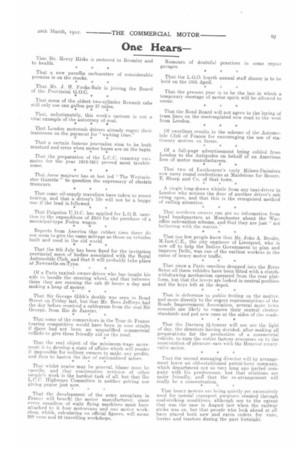One Hears— That Mr. Henry Hicks is restored to Bromley and to health.
Page 3

If you've noticed an error in this article please click here to report it so we can fix it.
That a new paraffin carburetter of considerable promise is on the stocks.
That Mr. J. H. Fooks-Bale is joining the Board of the Provincial G.O.C.
That some of the oldest two-cylinder Renault cabs still only use one gaiillon per 27 miles.
That, unfortunately, this week's cartoon is not a vital example of the autocracy of coal.
That London motorcab drivers already regret their insistence on the payment for "waiting time."
That a certain famous journalist Sims to be both mustard and cress when motor buses are on the tapis.
That the preparation of the L.C.C. tramway estimates for the year 1912-1913 proved most troublesome.
That force majeure has at last led "The Westminster Gazette" to question the supremacy of electric tramcars.
That some oil-supply travellers have taken to street touting, and that a driver's life will not be a happy one if the lead is followed, That Paignton II.D.C. has applied for L.G.B. sanction to the expenditure of £610 for the purchase of a municipal-type Foden wagon.
Reports from America that rubber tires there do not seem to give the same mileage as those on vehicles built and used in the old world.
That the 6th July has been fixed for the invitation provincial meet of bodies associated with the Royal Automobile Club, and that it will probably take place at Newcastle-on-Tyne.
Of a Paris taxicab owner-driver who has taught his wife to handle the steering wheel, and that between them they are running the cab 20 hours a, day and making a heap of money.
That Sir George Gibb's double was seen in Bond Street on Friday last, but that Mr. Rees Jeffreys had the day before received a cablegram from the real Sir George, from Rio de Janeiro.
That some of the competitors in the Tour de France touring competition would have been in sore straits if there had not been an unqualified commercial vehicle to give them friendly aid on the road.
That the real object of the minimum-wage movement is to develop a state of affairs which will render it impossible for colliery owners to make any profits, and thus to hasten the day of nationalized mines.
That whilst praise may be general, blame must be specific, and that constructive revision of other people's work is the hardest task of all. but that the L.C.C. IIighwa,ys Committee is neither getting nor giving praise just now.
That the development of the army aeroplane in France will benefit the motor manufacturer, since every squadron of eight flying machines must have attached to it four motorvans and one motor workshop. which. calculating on official figures, will mean 209 vans and 52 travelling workshops. Rumours of doubtful practices in some repair garages.
That the L.G.O. fourth annual staff dinner is to be held on the 13th April.
That the present year is to be the last in which a temporary shortage of motor spirit will be allowed to occur.
That the Road Board will not agree to the laying of train lines on the contemplated new road to the west from London.
Of excellent results in the scheme of the Automobile Club of France for encouraging the use of stationary motors on farms.
Of a full-page advertisement being cabled from Londen to the Antipodes on behalf of an American firm of motor manufacturers.
That two of Eastbourne's early Milnes-Daimlers now carry round confections at Maidstone for Messrs. E. Sharp and Co, of that town.
A single long-drawn whistle from any taxi-driver in London who notices the door of another driver's cab swing open, and that this is the recognized method of calling attention.
That northern owners can get no information from local headquarters at Manchester about the Waroffice subvention scheme, and that they are just " not bothering with the matter.
That too few people know that Mr. John A. Brodie, M.Inst.C.E., the city engineer of Liverpool, who is now off to help the Indian Government to plan and improve Delhi, was one of the earliest workers in the cause of heavy motor traffic.
That. since a Paris omnibus dropped into the River Seine all these vehicles have been fitted with a clutchwithdrawing mechanism operated from the rear platform, but that the levers are locked in neutral position and the keys left at the depot.
That in deference to public feeling on the matter, and more directly to the urgent representations of the Roads Improvement Association, several more town councils are likely to remove their central electric standards and put new ones at the sides of the roads.
Thai the Darracq 3i-tonner will not see the light of day, the directors haying decided, after making all preparations for the production of a commercial vehicle, to turn the entire factory resources on to the construction of pleasure cars with the Henriod rotaryvalve motor.
That the second managing director will by arrangement leave an old-established petrol-lorry company, which department not so very long ago parted company with his predecessor, but that relations are quite friendly, and that the re-arrangement will really be a concentration.
That heavy motors are being quietly yet extensively used for seecial transport purposes created through coal-striking conditions, although not to the extent that was the case in August last when the railway strike was on, but that people who look ahead at all have placed both new and extra orders for vans, lorries and tractors during the past fortnight.




















